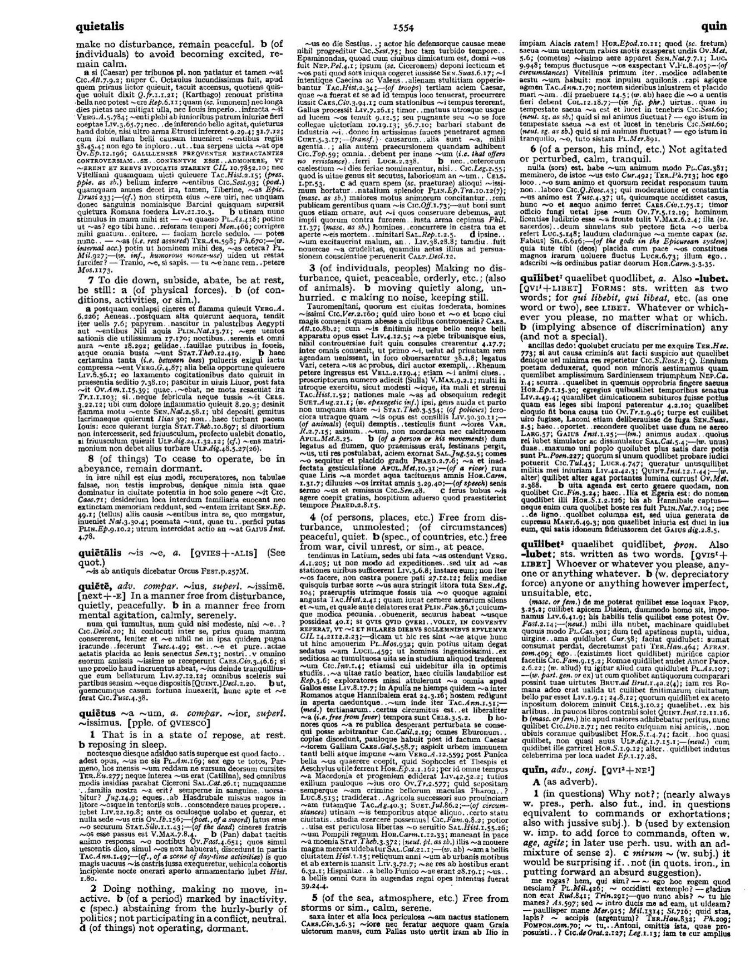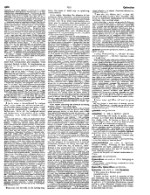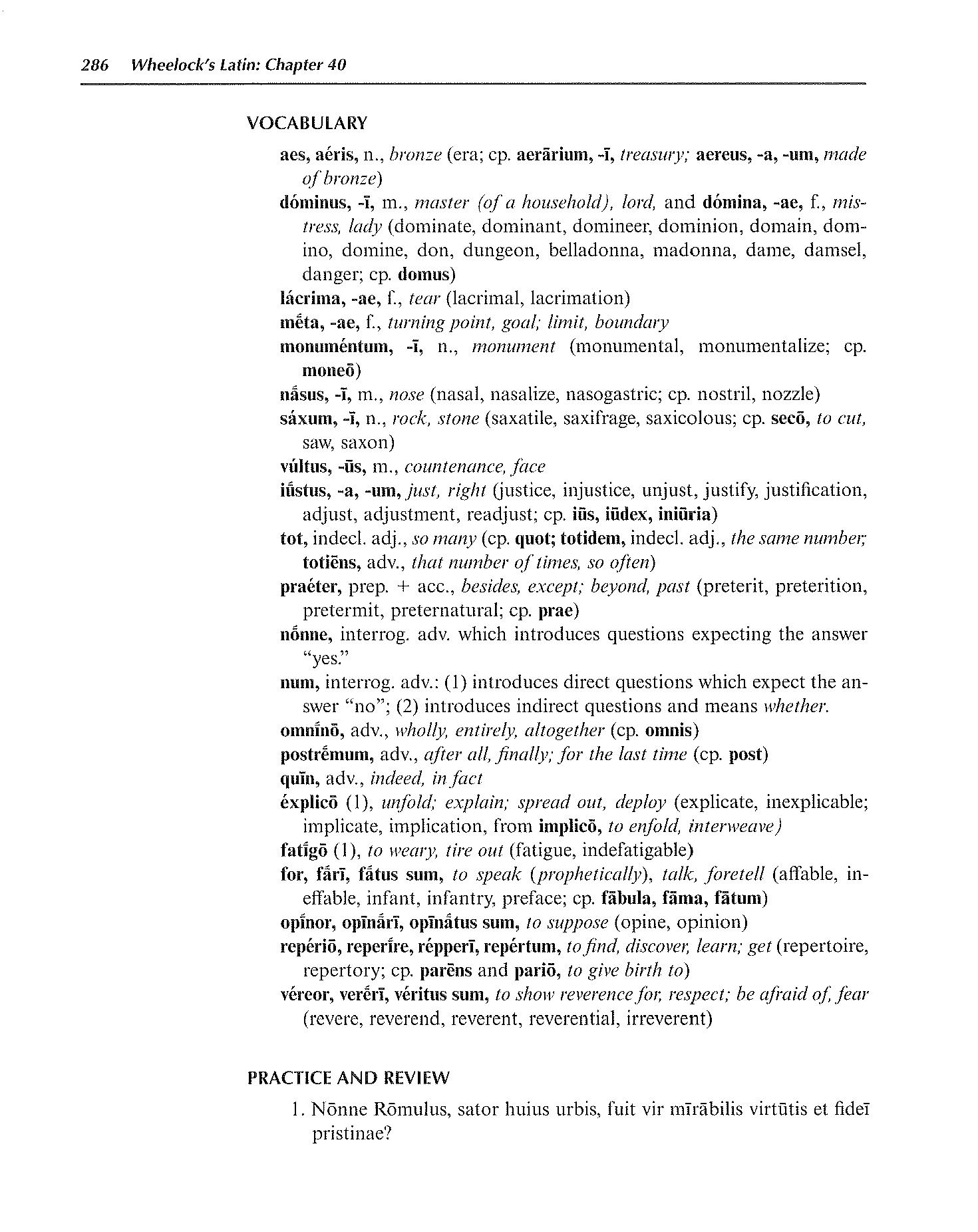
page_listing.tpl
page_subListingDetails.tpl
sub_listingDetails_style1.tpl
sub_listingDetails.title.tpl
quīn indeed
quīn is a Latin Adverb that primarily means indeed.
Definitions for quīn
Wheelock's Latin
Adverb
- 1
indeed, in fact
Oxford Latin Dictionary
Conjunction
- 1
(as conj. foll. by subj. in cls. having neg. force, the main cl. itself neg. or quasi-neg. unless stated) (w. exprs. denoting the absence of impediment, delay, objection, counter-measures etc.) So as to prevent (something happening), so that..not. (b) (w. nihil, haud, multum. etc., abest; also by analogy after paene factum est and sim.). (c) non possum (or sim.) facere, etc., ~, more briefly non possum, etc., ~, I cannot but, I have no choice but to; non potest (fieri) ~, it is impossible that..not. (d) (after an un-negatived vb. of preventing or sim., in place of the more usual quominus).
- 2
(w. exprs. denoting the absence of doubt, dispute, denial, etc.) (But) that.
- 3
(after neg. prons., advs., etc., in indicating the absence of exceptions to a general statement) Without its being the case that, but that. (b) (w. tam, etc., in main cl., introducing a neg. consecutive cl.). (c) nulla causa est~(or sim.), there is no reason why..not.
Adverb
- 1
(in questions) Why not?; (nearly always w. pres., perh. also fut., ind. in questions equivalent to commands or exhortations; also with jussive subj.). (b) (used by extension w. imp. to add force to commands, often with age, agite; in later use perh. usu. with an ad-mixture of sense 2). (c) mirum ~ (w. subj.) it would be surprising if.. not (in quots. iron., in putting forward an absurd suggestion).
- 2
(as emphatic adv., introducing a statement that corroborates and amplifies what precedes) Indeed, in fact. (b) (emphasizing an objection to the previous speaker's words) Why, but.
Sentences with quīn
Latin to English
Neque vērō Caesarem fefellit, quin ab eīs cohortibus ... initium victōriae orīrētur.Compare Nor was Caesar wrong in thinking that the beginning of his victory would arise from those cohorts.
Nemo est tam fortis quin rei novitate perturbetur.Compare No one is so courageous as not to be upset by an unexpected turn of events.
Uxor, vivamus, quod viximus, et teneamus nomina, quae primo sumpsimus in thalamo: nec ferat ulla dies, ut commutemur in aevo; quin tibi sim iuvenis tuque puella mihi. [Epigrammata, XL, Ad Uxorem, 1)Compare Wife, let us live as we have lived, and keep calling each other by the names we first used when we married. May the day never come that we should change, may I always be your young man, and you my girl.
Extremus elephantorum dies fuit. In quo admiratio magna vulgi atquae turbae, delectatio nulla exstitit; quin etiam misericordia quaedam consecuta est atque opinio eius modi, esse quamdam illi beluae cum gener humano societatem.Compare The last day was devoted to the elephants. The vulgar populace was enthusiastic, but there was no pleasure in it; indeed, the show provoked some sort of compassion, a feeling that there is some kinship between this great beast and humankind.
Non dubito, quin meus litterae libenter lego.Compare I did not doubt that you would read my letter with pleasure.
Quin opifex quoque, minime militia idoneus genus, excieo dicor.Compare Nay, the artisans too, a class by no means suited for military service, are said to have been called out.
Neque multum abest, quin etiam castra expello.Compare Nor was there much to save them from being driven also from the camp.
Data sources
Notes
- Definitions
- Frederick M. Wheelock, Wheelock's Latin, 6th ed., rev. Richard A. LaFleur (New York, NY: HarperCollins Publishers, 2005): 286.
- P. G. W. Glare, Oxford Latin Dictionary, Vols. 1-8 (Oxford: Clarendon Press, 1982): 1554.
- Word frequencies
- Christopher Francese, "Latin Core Vocabulary," Dickinson College Commentaries, last modified 2014, http://dcc.dickinson.edu.
- Paul B. Diederich, The Frequency of Latin Words and Their Endings, PhD diss., (Columbia University, 1939).
- Louis Delatte, Suzanne Govaerts, Joseph Denooz, and Etienne Evrard, Dictionnaire fréquentiel et index inverse de la langue latine [Frequency Dictionary and Inverse Index of the Latin Language] (Liège, Belgium: Laboratoire d'analyse statistique des langues anciennes de l'Université de Liège [L.A.S.L.A.], 1981): 119-219.
Bibliography
Allen, Joseph H. Allen and Greenough's New Latin Grammar for Schools and Colleges: Founded on Comparative Grammar. Edited by James B. Greenough, George L. Kittredge, Albert A. Howard, and Benjamin L. D'Ooge. Boston, MA: Ginn & Company, 1903.
Crystal, David. A Dictionary of Linguistics and Phonetics. 6th ed. Oxford, UK: Blackwell Publishing, 2008.
Delatte, Louis, Suzanne Govaerts, Joseph Denooz, and Etienne Evrard. Dictionnaire fréquentiel et index inverse de la langue latine [Frequency Dictionary and Inverse Index of the Latin Language]. Liège, Belgium: Laboratoire d'analyse statistique des langues anciennes de l'Université de Liège (L.A.S.L.A.), 1981.
Diederich, Paul B. The Frequency of Latin Words and Their Endings. PhD diss., Columbia University, 1939.
Francese, Christopher. "Latin Core Vocabulary." Dickinson College Commentaries. Last modified 2014. http://dcc.dickinson.edu/latin-vocabulary-list.
Gildersleeve, Basil L., and Gonzales Lodge. Gildersleeve's Latin Grammar: Third Edition, Revised, and Enlarged. 3rd ed. London, England: Macmillan and Co., 1903.
Glare, Peter G.W. Oxford Latin Dictionary. Vols. 1-8. Oxford, England: Clarendon Press, 1982.
Krüger, Bernd. "Latin Conjugation Tables." Cactus2000. Accessed May 5, 2023. https://latin.cactus2000.de/index.en.php.
Pierson, Nick. "Sound of Text." Accessed October 26, 2019. https://soundoftext.com.
Wheelock, Frederick M. Wheelock's Latin. 6th ed. Revised by Richard A. LaFleur. New York, NY: HarperCollins Publishers, 2005.
Wiktionary Contributors. "Victionarium." Wikimedia Foundation, Inc. Updated March 18, 2019. https://la.wiktionary.org/wiki/Victionarium:Pagina_prima.
Citation
Chicago (17th ed.)
Allo Contributors. "quīn (adv.) - Latin Word Definition." Allo Latin Dictionary. Last modified . Accessed February 23, 2026. http://ancientlanguages.org/latin/dictionary/quin.
Entry created on . Last updated on .








